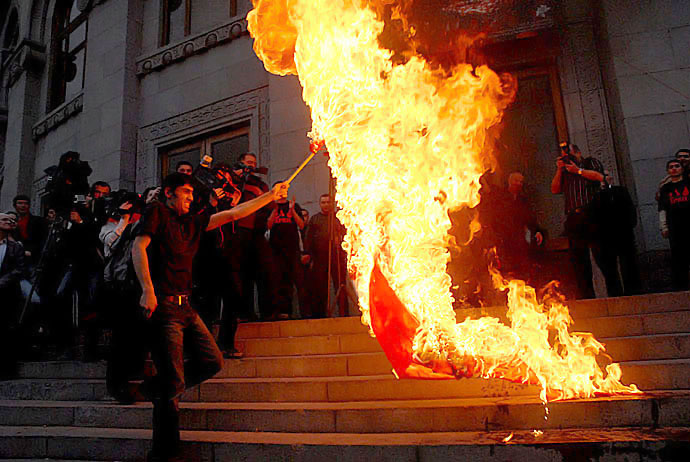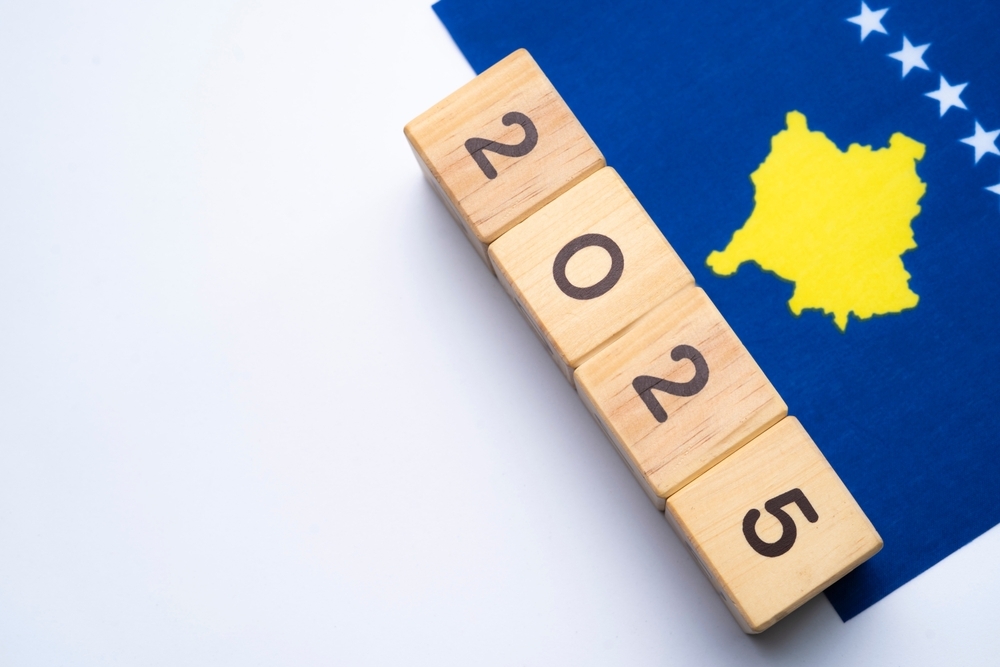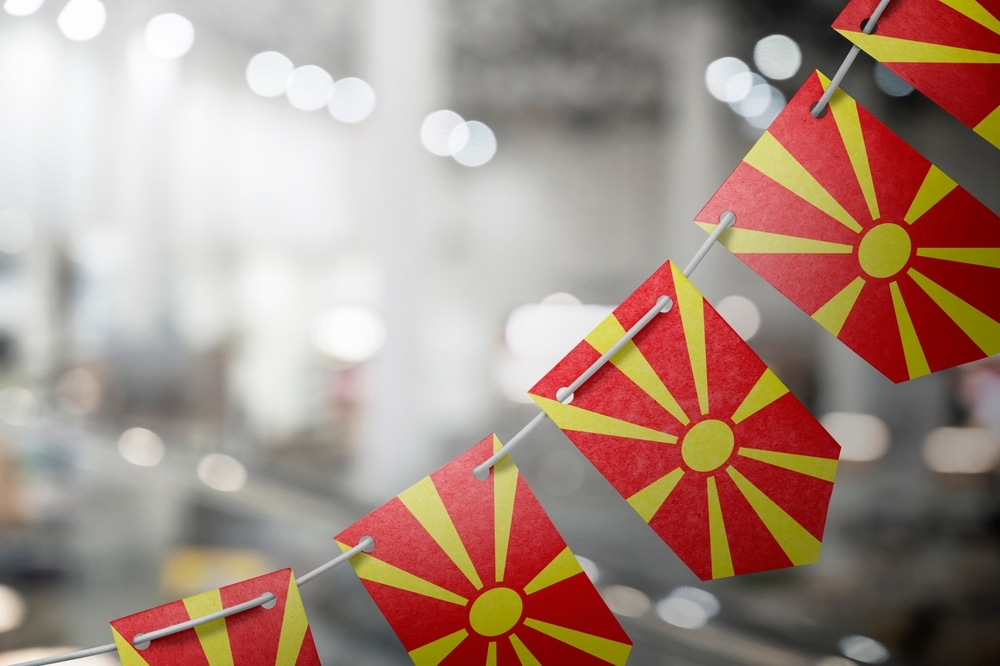Political Tensions Erupt in Armenia Over Proposed Genocide Legislation
With parliamentary elections on the horizon in 2026, tensions are increasing in Armenia where Prime Minister Nikol Pashinyan still hopes to normalise the country’s relations with neighbouring Azerbaijan, Turkiye, or both. The opposition now intends to use both issues to oust Pashinyan either before next year’s vote or during it

Armenia-polemiche-sul-genocidio-e-tensioni-politiche
Members of the youth wing of the nationalist Armenian Revolutionary Federation – Dasnaktsutyun burn the Turkish flag in central Yerevan on the eve of 24 April. Photo: Onnik James Krikorian 2008.
An altercation occurred in the Armenian National Assembly on April 22, sparked by a contentious proposal from opposition lawmakers seeking harsher penalties for those who deny or question the mass killing and deportation of up to 1.5 million Armenians by the Ottoman Empire in 1915 – an event widely recognised as genocide.
“We demand that the denial and belittling of the Armenian Genocide be considered a criminal act in itself, regardless of whether it is accompanied by hatred or not”, one opposition MP wrote on Facebook later.
While Armenia already has laws criminalising genocide denial, the new bill aims to broaden the scope by penalising anyone who denies the genocide, not just those inciting “hatred, discrimination, or violence”. If passed, the proposed legislation would increase punishment to up to five years in prison. However, introduced by the opposition, it is unlikely to pass.
It comes against the backdrop of efforts by Prime Minister Nikol Pashinyan to normalize relations with neighbouring Turkey – a move bitterly opposed by nationalist parties such as the Armenian Revolutionary Federation–Dashnaktsutyun (ARF-D) who also see it as a tool to remove Pashinyan ahead of the 2026 elections and to reignite nationalist fervour.
“His comments questioning the historical and national perception of the Armenian Genocide are an attempt to distance Armenia from the history that has long formed a cornerstone of its identity and foreign policy”, U.S.-based newspaper affiliated to the party opined. Other opposition forces also claim they will impeach Pashinyan in the near future.
The same was attempted a year ago but failed. Then lacking sufficient support, a number of political analysts and activists hope for a different outcome now.
Prominent figures from the Armenian-American rock band System of a Down joined the chorus of criticism. Bassist Shavo Odadjian posted an Instagram image of Pashinyan marked with a red cross and the caption, “He who erases […] history deserves to die”.
Guitarist Daron Malakian further escalated tensions by calling the band “venomous Armenian vipers” ready to “attack.”
In stark contrast, tens of thousands of Armenians in Yerevan participated in a solemn April 24 march to the Tsitsernakaberd memorial. The night before, Dashnaktsutyun’s youth wing led a smaller, more provocative torch-lit procession. Activists burned Azerbaijani and Turkish flags, wore clothing glorifying Operation Nemesis – a series of assassinations undertaken by the party in the 1920s.
“Prime Minister Pashinyan condemns the practice, considering it irresponsible and unacceptable. The burning of the flags of an internationally recognised state, especially neighbouring states, cannot be treated any differently by the head of state”, an official response read. Azerbaijani Foreign Minister Jeyhun Bayramov also condemned the incident, now an annual occurrence, and demanded it be criminalised.
Pashinyan continues to tread carefully. In his April 24 address, he chose the term Medz Yeghern – an Armenian phrase referring to the 1915 events – rather than explicitly using the word genocide. His earlier comments in Switzerland, where he urged Armenians to fully understand the causes of 1915 to prevent future tragedies, were similarly controversial and drew fire from nationalist groups.
Even the European Union Mission in Armenia (EUMA) found itself mired in controversy after initially tweeting a commemorative message using the term “Armenian Genocide” before deleting it and replacing it with a more ambiguous version. Similar balancing acts have plagued international responses in the past, with figures like former U.S. President Barack Obama and Donald Trump opting for Medz Yeghern to sidestep political fallout.
In early April, President of the European Commission Ursula von der Leyen signalled that Armenia normalising relations with Azerbaijan and Turkiye was a priority. “After three decades of closure, the opening of the borders of Armenia with Türkiye and Azerbaijan is going to be a game changer,” she remarked. It will bring Europe and Central Asia closer together like never before,” she said at an inaugural EU–Central Asia Summit.
At the heart of this ongoing controversy lies the unresolved and, some argue, unrealistic goal of seeking financial and territorial reparations from Turkey. Yet, when the
Turkish-Armenian Reconciliation Commission (TARC) sought legal clarity from the International Center for Transitional Justice (ICTJ) in the early 2000s, the verdict was clear – the 1948 Genocide Convention cannot be applied retroactively.
Domestically, the genocide narrative has often been co-opted for political leverage. The term ‘genocide’ had anyway been introduced decades after the events of 1915, though defined by those incidents, and the opposition has vowed to centre its pre-election campaign around that issue as well as the complete loss of Karabakh in 2023. But legislating historical interpretation risks silencing debate and further isolating Armenia.
One of Pashinyan’s allies encapsulated this dilemma on social media: “Reconcile with reality. I understand our wounds are deep. But only by acknowledging defeat can we decide how to build a stronger Armenia. A whole nation cannot be constantly dragged into the past,” wrote Robert Ananyan.
The debate is not without precedent. In 2006, when France considered criminalising Armenian Genocide denial, the late Turkish-Armenian journalist Hrant Dink – who was later assassinated – strongly opposed the measure. “If this bill becomes law, I will be among the first to head for France and break the law”, he declared. “What the peoples of these two countries need is dialogue. And all these laws do is harm such dialogue”.
In today’s Armenia, Dink’s warning remains chillingly relevant. As political factions clash over history and identity, the path to reconciliation — both internally and regionally grows ever more fraught.
In his own address to what remains of Turkiye’s ethnic Armenian minority, Turkish President Tayyip Erdogan said the “sad memories of the past should not hold the present and the future hostage.”
“A Republic of Armenia, that is developed, sovereign, secure, […], with demarcated borders, is the means to survive the tragedy of the Medz Yeghern, the guarantee of our loyalty to all the sacrifices and victims of our people”, Pashinyan said.
Tag:








